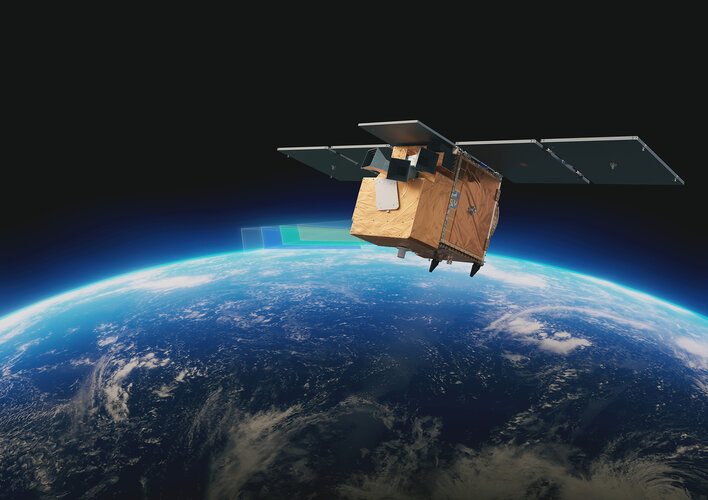
Copernical Team
Follow the Celeste launch campaign

The first two satellites of ESA’s Celeste LEO-PNT demonstration mission are scheduled to lift off no earlier than 24 March, aboard Rocket Lab’s Electron rocket from the company’s Māhia Launch Complex in New Zealand.
Counting craters

Craters, craters, and yet more craters: this snapshot from ESA’s Mars Express is packed full of them, each as fascinating as the last.
Hubble & Euclid zoom into cosmic eye

For this month’s ESA/Hubble Picture of the Month, NASA/ESA's Hubble Space Telescope is joined by ESA’s Euclid to create a new view of the most visually intricate remnants of a dying star: the Cat’s Eye Nebula, also known as NGC 6543.
Testing ozone-monitoring satellite’s solar wings

Over the past year, satellite engineers at Redwire Space in Belgium have been hard at work assembling European Space Agency’s ozone-monitoring satellite, ALTIUS. The team has now passed a major milestone: testing the deployment of the satellite’s two solar panels, a critical step in preparing it for life in orbit.
Antarctica retreat study signals future ice loss

The ice along Antarctica’s ‘grounding lines’ has been largely stable over the past 30 years – but ice has retreated by more than 40 km in some areas, a new study based on satellite data finds.
Self-repairing spacecraft could change future missions

ESA and GSMA Foundry launch new round of challenges for smoother connectivity

The European Space Agency (ESA) and GSMA Foundry have opened a call for ideas to provide up to €100 million in funding for projects improving the combined use of satellite and ground connectivity networks. The funding opportunity – provided by ESA Member States and announced during the 2026 Mobile World Congress (MWC) in Barcelona, Spain – will empower companies to bridge the digital divide.
NASA astronaut who required evacuation from ISS 'doing very well'
 The astronaut who faced a health issue prompting the first-ever medical evacuation in International Space Station history is "doing very well," he said in a statement issued by NASA on Wednesday.
Mike Fincke, 58, said he's "doing very well and continuing standard post-flight reconditioning" at NASA's center in Houston.
NASA had previously declined to identify which astronaut experienced
The astronaut who faced a health issue prompting the first-ever medical evacuation in International Space Station history is "doing very well," he said in a statement issued by NASA on Wednesday.
Mike Fincke, 58, said he's "doing very well and continuing standard post-flight reconditioning" at NASA's center in Houston.
NASA had previously declined to identify which astronaut experienced NASA rolls Moon rocket off launchpad for repairs
 NASA on Wednesday was rolling its towering Moon rocket back to its hangar for repairs, after windows for liftoff were pushed back over technical issues.
The US space agency said it would roll its 322-foot (98-meter) SLS rocket off the launchpad in Cape Canaveral, Florida after teams detected issues with helium flow.
The decision means further delays for the highly anticipated Artemis 2 m
NASA on Wednesday was rolling its towering Moon rocket back to its hangar for repairs, after windows for liftoff were pushed back over technical issues.
The US space agency said it would roll its 322-foot (98-meter) SLS rocket off the launchpad in Cape Canaveral, Florida after teams detected issues with helium flow.
The decision means further delays for the highly anticipated Artemis 2 m NASA announces overhaul of Artemis lunar program amid technical delays
 NASA on Friday abruptly said it was shaking up its Artemis lunar program that has suffered multiple delays in recent years, a bid to ensure Americans can return to the Moon's surface by 2028.
That goal remains unchanged, but the US space agency is shifting its flight lineup to include a test mission before an eventual lunar landing to improve launch "muscle memory," NASA administrator Jared
NASA on Friday abruptly said it was shaking up its Artemis lunar program that has suffered multiple delays in recent years, a bid to ensure Americans can return to the Moon's surface by 2028.
That goal remains unchanged, but the US space agency is shifting its flight lineup to include a test mission before an eventual lunar landing to improve launch "muscle memory," NASA administrator Jared 



































